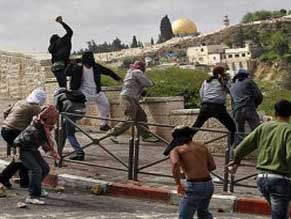|
World Jewish News

Palestinian demonstrators hurl stones during clashes in
east Jerusalem Tuesday. (AP)
|
Israel opens Temple Mount, lifts closure on the West Bank
17.03.2010, Israel Israel on Wednesday lifted its closure on the West Bank and granted open access to Jerusalem's holiest shrine.
Police say thousands of troops will remain on high alert but reported no disturbances Wednesday as calm returned. Israel originally sealed off the territory last week.
Wednesday's measures came a day after the heaviest clashes in months broke out across the city during the orchestrated "day of rage" announced by Hamas. Hundreds of Palestinians in east Jerusalem set tires and garbage bins ablaze and hurled rocks at Israeli riot police, who responded with rubber bullets and tear gas.
Police had predicted that Palestinian rioters would continue to stage violent protests on Wednesday in East Jerusalem and elsewhere, but the area was quiet during the morning hours.
Unknown assailants on Tuesday opened fire on a police officer patrolling the Ras al-Amud neighborhood in the east of the capital, hitting him in the hand and inflicting a minor injury, as violence seemed to spread to other parts of the country. Assailants in Jaffa hurled rocks at two public buses, and a truck in the Negev was hit by stones.
Fourteen other police officers sustained minor injuries from stones hurled at them by protesters, of whom a few required medical treatment. Approximately 60 people were arrested on suspicion of hurling stones at security forces.
Police chief David Cohen toured Jerusalem's Old City as clashes between Palestinians and Israeli security forces were ongoing, and said he did not believe the recent violence would spark a third intifada. "We are seeing signs of disorderly conduct," said Cohen, "but that is only a headline. We must be careful about characterizations and remarks being made."
The police chief also stressed that the city has a unique character that must be preserved, and that peace must be maintained in both the Arab and Jewish neighborhoods. Cohen added that the police will beef up its presence in the eastern part of the capital and surrounding villages until Friday and over the weekend, with the intention of returning to routine deployment by Sunday.
Police responded to Tuesday's riots, stone-throwing and burning of tires on roads by firing tear gas and rubber bullets, witnesses said. Some 40 Palestinians were treated at East Jerusalem hospitals for minor injuries, medical officials said. Police also arrested an Israeli rightist who tried to enter the Temple Mount compound and was refused by security forces.
Some 3,000 officers were put on high alert after Hamas, an Islamist group that controls the Gaza Strip and wields influence in the West Bank and East Jerusalem, called for anti-Israel protests. "We call on the Palestinian people to regard Tuesday as a day of rage against the occupation's [Israel's] procedures in Jerusalem against Al-Aqsa mosque," Hamas said in a statement.
Thousands of Palestinians, meanwhile, staged a protest march in the Gaza Strip to protest Israeli measures in Jerusalem. Ahmed Bahar, a senior figure in Hamas, called for an escalation of armed attacks against Israel and urged Arab states "to shoulder their responsibilities and send their warplanes and armies to rescue the Al-Aqsa mosque and end the Jewish policy of Judaizing Jerusalem."
The head of the police's Jerusalem District, Aharon Franco, said that despite the clashes, police at present intend to stand by their decision to permit right-wing activists Itamar Ben-Gvir and Baruch Marzel to conduct a protest march under the banner "We Demand Equal Enforcement" in the Silwan neighborhood in East Jerusalem. The maximum number of participants is 70, as per the police's restrictions. Franco nonetheless said that the decision to allow the procession "is subject to change."
Tuesday's riots began with two fire bombs that unknown assailants hurled at a house occupied by Jews in Silwan. As riots and stone-throwing occurred elsewhere, police blocked traffic into Jerusalem of Muslim worshipers from other areas of Israel, including the Galilee.
In Wadi Joz in East Jerusalem, a squad of undercover police officers dressed in civilian clothes and kaffiyes, arrested several protesters and dispersed the crowd that gathered there.
Haaretz.com
|
|
